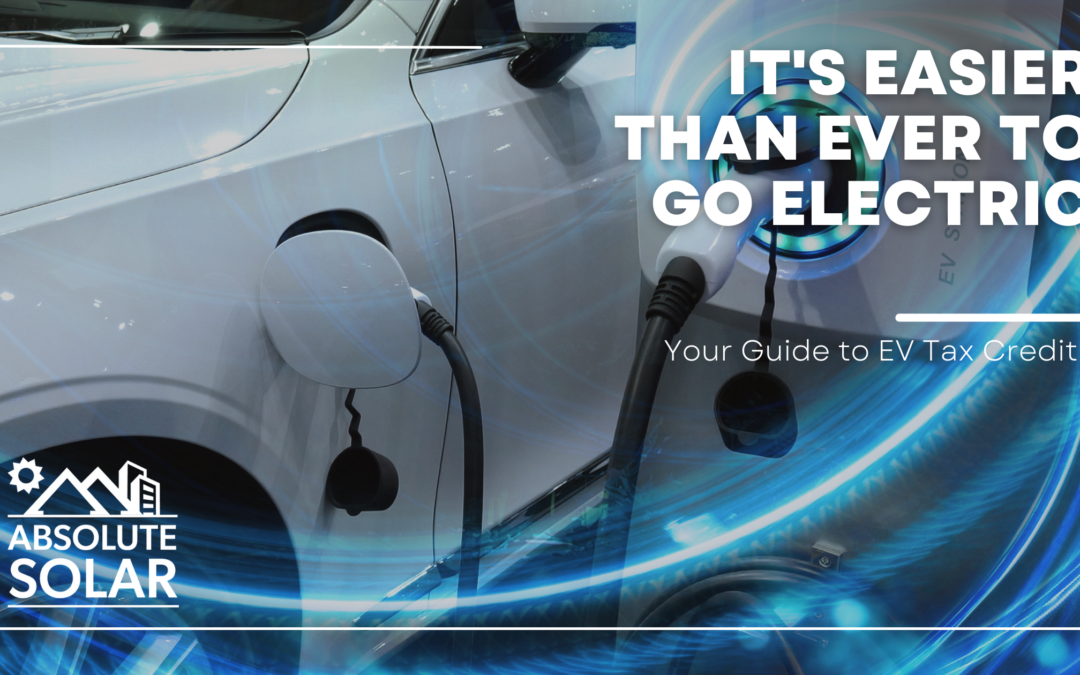It’s Easier Than Ever to Go Electric |
Your guide to EV tax credits
The future is electric. Thanks to the electric vehicle (EV) tax credit included in the Inflation Reduction Act signed into law in August 2022, the average car buyer can join in, help protect the environment and save thousands of dollars.
Replacing gas-powered vehicles with EVs represents a major step toward reducing greenhouse gas emissions and lessening our dependence on fossil fuels. According to the U.S. Department of Energy, if the U.S. transitioned all light-duty vehicles into hybrids or plug-in EVs, “we could reduce our dependence on foreign oil by 30-60 percent while lowering the carbon pollution from the transportation sector by 20 percent.”
In the early 2010s, EV vehicles were often priced at luxury levels, making them unattainable for the average car buyer. The EV tax credit not only helps consumers save thousands, but it has also increased overall demand, a nice dovetail for an industry-wide shift already in motion. Today, nearly every major car manufacturer has at least one EV model on the market, ready to meet the booming demand for electric vehicles.
If you’re ready to purchase an EV (and save thousands of dollars), keep reading.
How Much Does the EV Tax Credit Offer?
The Clean Vehicle Energy Credit gives taxpayers up to $7,500 in tax credits for purchases of new, qualified EVs, and up to $4,000 on qualified used EVs (limited to 30% of the sale price). In order to encourage more consumers to make the switch to EV vehicles, the tax credit has income caps for modified adjusted gross income.
Single: $150,000
Head of Household: $225,000
Married, filing jointly: $300,000
Married, filing separately: $150,000
In addition to encouraging consumers to switch over to EVs from gas-powered vehicles, the legislation also aims to increase domestic production. So it’s important to keep in mind that in order for your purchase to qualify for the tax credit, the vehicle’s final assembly must take place in North America.
If you decide to purchase an EV, you can take advantage of the EV tax credit by filling out Form 8936 and filing it with your taxes for the year in which you purchased the vehicle. A tax credit is a dollar-for-dollar reduction in the amount of income taxes that you would otherwise owe. They are nonrefundable. So, while a tax credit can bring your taxes owed down to $0, you cannot receive any refunds for any remaining unused credits and you cannot roll over any unused credits.
Is an EV Right for You?
Making the switch to an EV can be an adjustment depending on your lifestyle and commuting habits.
Since EV demand has increased and technology has evolved, vehicle batteries have become bigger and more efficient, making it simpler to travel farther distances between charges. Before taking the plunge on EVs, consider your own driving habits. The average driver commutes around 30 miles a day, a manageable amount for most EV batteries. Does that metric align with your own habits? Take a look at commercial EV charging stations in your neighborhood from providers like ChargePoint to see if there are established charging stations available at your workplace or elsewhere in your community. You can increase your daily commute capabilities by finding simple ways to get a charge mid-day. This will become easier as the EV boom continues, fueling more and more commercial properties to invest in EV infrastructure.
If you decide to purchase an EV, invest in a professionally installed Level 2 EV charger for your home or garage. They can fully charge your vehicle’s battery from empty in a matter of a few hours, depending on the battery size. In most cases, eligible models of Level 2 EV chargers qualify you for a $500 rebate from your local utility company. For Mid-Michigan-based, customers, it may be helpful to know that the residential EV charger installed by Absolute Solar is eligible for rebates from Consumers Energy, BWL, and DTE. Reach out to the team at Absolute Solar or your local utility company for more information on these rebates.
Lastly, prepare yourself for the energy trade-offs. In addition to the generous tax break, EV owners save thousands of dollars in fuel costs over the lifetime of their vehicles. But you will notice a substantial uptick in your home’s electricity usage. However, it’s not a dollar-for-dollar trade between gasoline and electricity. EV owners typically spend between 8 and 27 cents per kilowatt-hour (kWh) to charge their vehicles compared to much higher rates at the gas pump. If you are concerned about a drastic increase in your electricity bill, our team at Absolute Solar can discuss bundling your EV charger install with a solar panel system, helping you to save money in the long run and go the extra mile to protect the planet. If your home needs any other electrical work to prepare for a solar panel or EV charger, we can bundle those preparation and installation costs together for additional cost savings.
Ready for the Next Step?
Going green has never been easier. If you’re in the market for a new car, you are essentially leaving money on the table by NOT considering an EV. Take advantage of the EV Tax Credit and the Solar Panel Tax Credit to prepare your home for a greener future. Our team at Absolute Solar is ready to help.

